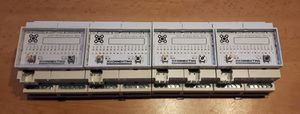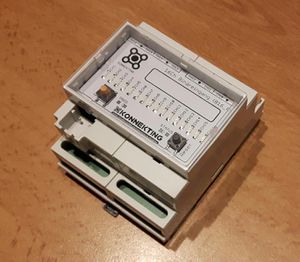Difference between revisions of "16CH Binary Input"
Jump to navigation
Jump to search
| Line 21: | Line 21: | ||
== Description == | == Description == | ||
| + | 16ch Binary Input (potential-free) | ||
| + | |||
| + | The binary input has 16 inputs available and is used to connect eight conventional push-buttons or floating contacts such as window or relay contacts. | ||
| + | There is one status LED for each input. In addition, the input status is sent to the bus. A separate power supply is not necessary | ||
| + | |||
| + | Technical Data: | ||
| + | - 16 Inputs (potential-free / floating contacts) | ||
| + | - Counting of pulses, suitable for 30ms S0 pulses (CH13 -CH16 can use for S0) | ||
| + | - wire length tested 30m (more possible) | ||
| + | - The device makes a contact supply voltage (5V) which is '''not''' electrically isolated from the bus voltage! | ||
== Hardware == | == Hardware == | ||
Revision as of 14:37, 18 February 2018
| 16CH Binary Input | |
|---|---|
| Developer | Matthias F. |
| Status | Version 1.0 finished |
| Microcontroller/Board | |
| KNX connectivity | Mini-BCU |
Description
16ch Binary Input (potential-free)
The binary input has 16 inputs available and is used to connect eight conventional push-buttons or floating contacts such as window or relay contacts. There is one status LED for each input. In addition, the input status is sent to the bus. A separate power supply is not necessary
Technical Data:
- 16 Inputs (potential-free / floating contacts) - Counting of pulses, suitable for 30ms S0 pulses (CH13 -CH16 can use for S0) - wire length tested 30m (more possible) - The device makes a contact supply voltage (5V) which is not electrically isolated from the bus voltage!

